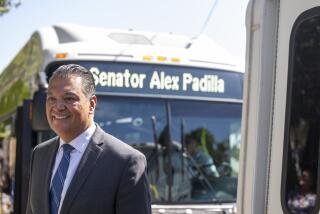Traffic Has State on Road to Ruin, 2 Reports Warn
- Share via
Traffic congestion strangling California freeways may become the most important environmental and economic issue of the decade, according to two very different groups, the Sierra Club and the more conservative Californians for Better Transportation.
In its annual “Green State of the State” report released today, the Sierra Club warned that, unless dramatic changes are made in California’s transportation system, the state is headed for worsening traffic congestion and environmental catastrophe.
“Transportation is California’s environmental issue of the decade,” the club contended, and the masses of cars carrying only the driver are what “fuel the problems of smog, global warming, oil spills and contamination.”
Putting the traffic problems in economic terms, Californians for Better Transportation reported that the rapidly increasing congestion on the state’s freeways and urban streets already costs motorists $17 billion a year in lost time, increased fuel and car repair costs.
“Transportation may be the economic issue of the ‘90s,” said Ray Remy, a spokesman for the highway lobby group and president of the Los Angeles Area Chamber of Commerce. “If we can’t move goods and people, that is only going to have increasing economic consequences.”
The Sierra Club and Californians for Better Transportation strongly support the complex gasoline tax measure that will be on the June ballot. The proposition would allow the state to raise $18 billion over the next 15 years to fight congestion and to come up with mass transit alternatives.
Nowhere is the problem more acute than in Southern California. Los Angeles leads the nation in every negative traffic indicator, according to a third new traffic study. No other big city relies so heavily on already congested freeways and urban streets to move people and goods, according to the study by Texas A&M; University transportation experts.
The nut of the problem is that transportation expenditures have not kept pace with California’s rapid population growth. As a result, traffic in urban areas such as Southern California and San Francisco is grinding to a halt. California now is last among states in highway spending per mile, and funds for rapid transit projects have been cut back in the past decade, critics say.
Statewide, traffic has increased by 55% since 1980 and now stands at 241 billion vehicle-miles a year, but the miles of new road construction have increased less than 2% in the same period. Two-thirds of the existing roads are in “fair to very poor condition,” and the cost of bringing them up to good standards is estimated at $8.6 billion, according to Californians for Better Transportation.
The Sierra Club report--called “Heading the Wrong Way: Redirecting California’s Failed Transportation Policy”--sharply criticized government at all levels over the past quarter-century, contending that politicians have failed to fund, build and maintain a modern transportation system.
The environmentalists take dead aim at those developers and government agencies that have carved up rural areas, creating urban sprawl that in turn puts more traffic on already overburdened freeways and roads. The new highways and freeways that have followed such developments have been built at public expense for private gain without thought to environmental damage, the club charged.
“In Los Angeles, an astonishing two-thirds of the urban space is dedicated to transportation,” the club’s experts reported. They said that cars account for more than half the state’s urban air pollution and that highway expansion projects damage or destroy wildlife habitats.
“How we solve the problems created by the state’s worsening transportation system is the most important environmental decision California will make going into the 21st Century,” the Sierra Club concluded. The club is demanding that more emphasis be put on getting drivers to car-pool or ride-share and that more effort be put into developing urban mass transit.
While the Sierra Club and Californians for Better Transportation are very different groups--the one representing environmentalists, the other a coalition of highway user groups--their studies have brought them to many of the same conclusions.
“Traffic congestion is threatening to shut down the state’s road and highway system,” said Jack Maltester, president of Californians for Better Transportation. And the results have a direct impact not only on the movement of goods and services, but on the motorist’s pocketbook.
The highway group’s report found that by 1988 congestion had added 20 minutes to the average commuter’s drive time, and that figure is expected to double or triple in the next 10 years if nothing is done. The average motorist pays $1,200 a year because of the delays, added fuel and repair costs, the report stated.
In Orange County, traffic congestion is expected to cost commuters and their employers even more in lost time, wages, fuel and vehicle maintenance by the year 2010 than it will cost residents and businesses in Los Angeles County, according to the Southern California Assn. of Governments, a regional planning agency.
That’s because Orange County began experiencing tremendous growth with fewer freeway and major arterial miles in place, and because there are fewer alternate routes available to motorists when tie-ups occur, transportation experts say.
If transportation projects already planned and funded are completed, traffic congestion will cost Orange County residents and businesses a total of $9 billion annually by the year 2010, compared to $8.8 billion in Los Angeles, studies show.
In 1984, the last year for which such estimates are available, congestion cost Orange County residents and businesses an estimated $392.1 million annually.
The bottom line, Maltester said, is that the state’s motorists are “paying a premium to drive on rough, congested roads.”
Times staff writer Jeffrey Perlman contributed to this story from Orange County.
More to Read
Sign up for Essential California
The most important California stories and recommendations in your inbox every morning.
You may occasionally receive promotional content from the Los Angeles Times.










